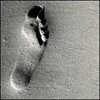History of Madness
Foucault
When it was first published in France in 1961 as Folie et déraison: Histoire de la folie ŕ l'âge classique, few had heard of a thirty-four year old philosopher by the name of Michel Foucault. By the time an abridged English edition was published in 1967 as Madness and Civilization, Michel Foucault had shaken the intellectual world. This translation is the first English edition of the complete French texts of the first and second edition, including all prefaces and appendices, some of them unavailable in the existing French edition. Challenging entrenched views of madness and reason, History of Madness is one of the classics of twentieth century thought. It is Foucault's first major work, written in a dazzling, and sometimes enigmatic, literary style. It also introduces many of the inspiring and radical themes that he was to write about throughout his life, above all the nature of power and social exclusion. History of Madness begins in the Middle Ages with vivid descriptions of the exclusion and confinement of lepers. Why, Foucault asks, when the leper houses were emptied at the end of the Middle Ages, were they turned into places of confinement for the mad? Why, within the space of several months in 1656, was one out of every hundred people in Paris confined? Foucault's bold and controversial answer is that throughout modern history, madness has meant isolation, repression and exclusion. Even the Enlightenment, which attempted to educate and include the mad, ended up imprisoning them in a moral world. As Foucault famously declared to a reporter from Le Monde in 1961, 'Madness exists only in society. It does not exist outside the forms of sensibility that isolate it, and the forms of repulsion that expel it or capture it.' Shifting brilliantly from Descartes and early Enlightenment thought to the founding of the Hôpital Général in Paris and the work of early psychiatrists Philippe Pinel and Samuel Tuke, Foucault focuses throughout, not only on scientific and medical analyses of madness, but also on the philosophical and cultural values attached to the mad. He also urges us to recognise the creative and liberating forces that madness represents, brilliantly drawing on examples from Goya, Nietzsche, Van Gogh and Artaud. The History of Madness is an inspiring and classic work that challenges us to understand madness, reason and power and the forces that shape them.
więcej
Informacje dodatkowe o History of Madness:
Wydawnictwo: angielskie
Data wydania: b.d
Kategoria: Socjologia, filozofia
ISBN:
Liczba stron: 0
Kup książkę History of Madness
Sprawdzam ceny dla ciebie ...
Cytaty z książki
REKLAMA



















Przeczytane:2011-10-09, Przeczytałam,